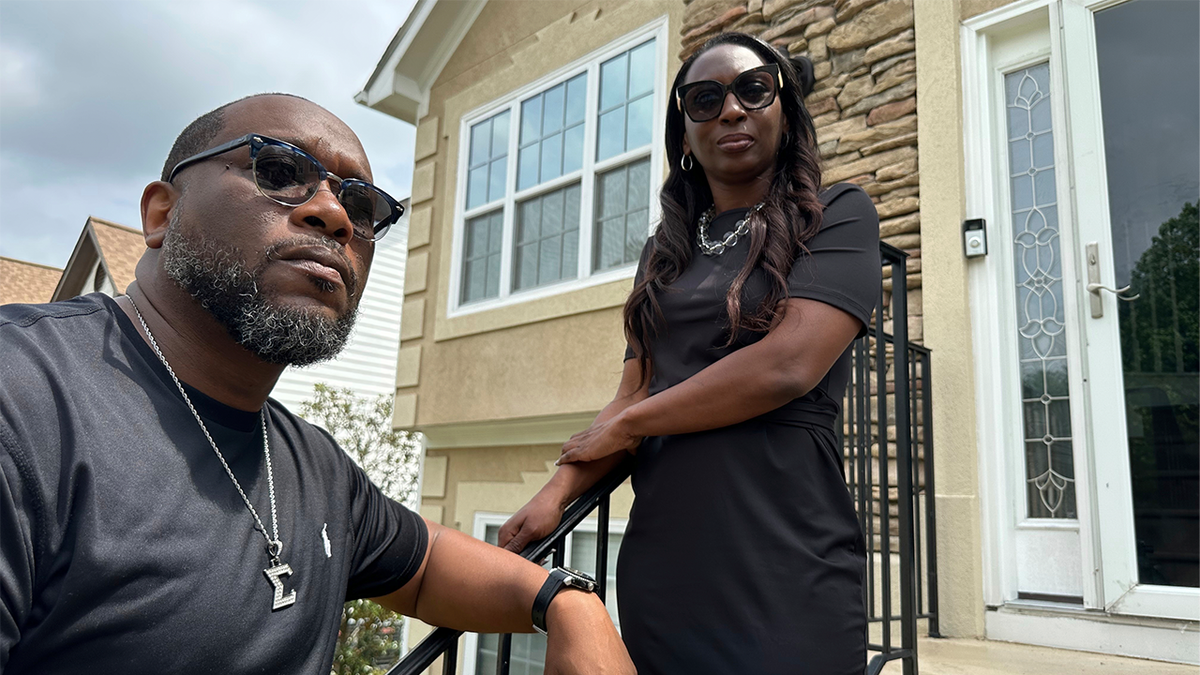The U.S. Supreme Court is set to hear arguments in a legal battle over a woman’s lawsuit against the U.S. government for FBI agents mistakenly raiding their home in Atlanta, Georgia.
Trina Martin’s home was broken down by FBI agents before dawn on Oct. 18, 2017. Agents stormed into her bedroom and pointed guns at her and her then-boyfriend while her son, 7, screamed for his mother from another room.
Martin, 46, was blocked from attending to her child for what she said felt like an eternity until agents realized they had busted into the wrong house while looking for a suspected gang member.
An attorney for Martin will go before the Supreme Court on Tuesday to ask for the reinstatement of her 2019 lawsuit against the U.S. government accusing the agents of assault and battery, false arrest and other violations.
AHEAD OF KEY SUPREME COURT ARGUMENTS, HERE’S WHICH STATES HAVE PASSED SCHOOL CHOICE MEASURES

Toi Cliatt, left, and Trina Martin stand outside the home which the FBI mistakenly raided in 2017, in Atlanta on Friday, April 25, 2025. (AP)
A federal judge in Atlanta dismissed the lawsuit in 2022 and the 11th U.S. Circuit Court of Appeals upheld that ruling last year.
The key issue the justices will consider is under what circumstances can the federal government be sued in an effort to hold law enforcement accountable.
Martin’s attorneys said Congress clearly gave the green light to those lawsuits in 1974 after a pair of law enforcement raids on wrong houses, as blocking the lawsuits would leave little recourse for her and others who experienced similar incidents.
FBI Atlanta spokesperson Tony Thomas told The Associated Press that the agency cannot comment on pending litigation.
Lawyers for the government argued in Martin’s case that courts should not be “second-guessing” law enforcement decisions. The FBI agents did advance work and attempted to locate the correct house, making this raid different from the no-knock, warrantless raids that prompted Congress to take legislative action in the 1970s, the Justice Department claimed in court filings starting under the Biden administration.
The 11th Circuit largely agreed with that argument when dismissing Martin’s case, claiming courts cannot second-guess police officers who make “honest mistakes” in searches. The agent who led the raid said his personal GPS led him to the wrong place. The FBI’s target was located a few houses away.
Martin, her then-boyfriend, Toi Cliatt and her son were left traumatized, she said.
“We’ll never be the same, mentally, emotionally, psychologically,” she told The Associated Press on Friday at the home that was raided. “Mentally, you can suppress it, but you can’t really get over it.”
She and Cliatt, 54, showed where they were sleeping when the agents broke in and the master bathroom closet where they hid.
Toi Cliatt talks about the raid in the bedroom where he and then-girlfriend Trina Martin were sleeping when the FBI broke into their home, in Atlanta on Friday, April 25, 2025. (AP)
Martin stopped coaching track because the starting pistol reminded her of the flashbang grenade the agents set off in the raid. Cliatt said he had to leave his truck-driving job because he could not sleep.
“The road is hypnotizing,” he said. “I became a liability to my company.”
Martin said her son became extremely anxious, explaining that he began pulling threads out of his clothes and peeling paint off walls.
Cliatt initially believed the raid was a burglary attempt and ran toward the closet, where he kept a shotgun. Martin said her son still expresses fear that she could have been killed if she confronted the agents while armed.
“If the Federal Tort Claims Act provides a cause of action for anything, it’s a wrong-house raid like the one the FBI conducted here,” Martin’s lawyers wrote in a brief to the Supreme Court.
Other U.S. appeals courts have interpreted the law more favorably for victims of raids on wrong houses, creating conflicting legal standards that only the high court can resolve, the lawyers say.
After agents broke down the door to the house, an FBI SWAT team member dragged Cliatt out of the closet and placed him in handcuffs.
But one of the agents noticed he did not have the tattoos that the suspect had, court documents show. The agent asked for Cliatt’s name and address, and neither matched those of the suspect.
The room then went quiet as agents realized they had raided the wrong house.
ATLANTA APPROVES $1.4M SETTLEMENT FOR FAMILY OF MAN KILLED BY OFFICER ACQUITTED IN 2019 SHOOTING
The Atlanta home where Trina Martin, her then-boyfriend Toi Cliatt and her 7-year-old son were living when the FBI broke down the door and stormed in, is seen on Friday, April 25, 2025. (AP)
Cliatt was uncuffed, and the agents left for the correct house, where they arrested the man they were searching for.
The agent leading the raid returned later to Martin’s home to apologize and leave a business card with a supervisor’s name. Cliatt said the family received no compensation from the government, not even for the damage to the house.
Martin said the most distressing part of the raid was her son crying.
“When you’re not able to protect your child or at least fight to protect your child, that’s a feeling that no parent ever wants to feel,” she said.
The Associated Press contributed to this report.
https://www.foxnews.com/us/supreme-court-hear-arguments-after-fbi-mistakenly-raided-womans-atlanta-home-well-never-same